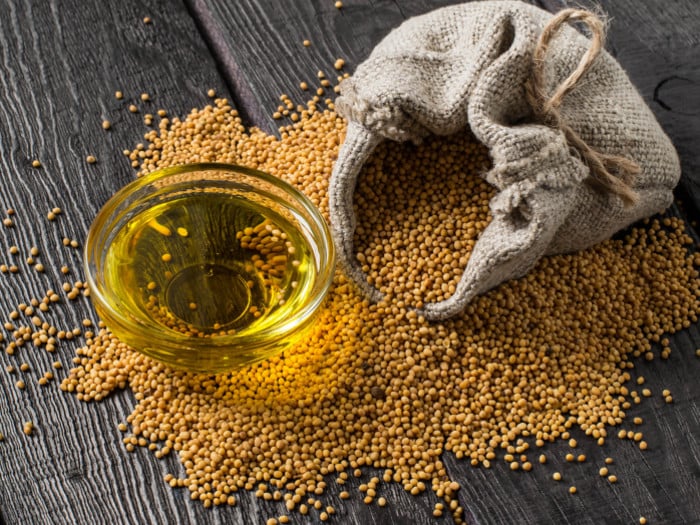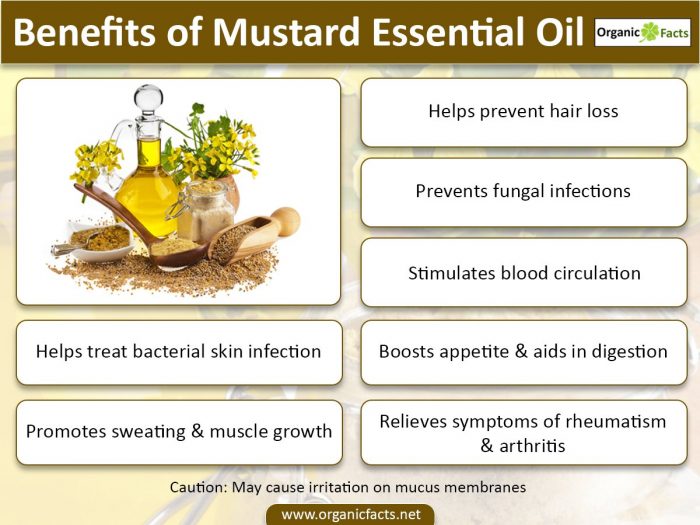The health benefits of mustard essential oil can be attributed to its properties as a stimulant, irritant, appetizer, antibacterial, antifungal, insect repellant, hair vitalizer, cordial, diaphoretic, antirheumatic, and a tonic substance.
What is Mustard Essential Oil?
Mustard essential oil, often mistaken for mustard oil, is made from mustard seeds through a distillation process. Mustard essential oil is also called volatile oil of mustard. The essential oil contains 92% allyl isothiocyanate, which is the compound responsible for the pungent taste of mustard. It is this allyl isothiocyanate, along with important fatty acids like oleic acid, linoleic acid, and erucic acid, which contribute to the long list of medicinal benefits of mustard essential oil. While it is safe to consume in small amounts, the essential oil is usually used topically.
Health Benefits of Mustard Essential Oil
The health benefits of mustard essential oil are mentioned below in detail:
Aids in Digestion & Detoxification
Mustard essential oil promotes digestion by stimulating the secretion of gastric juices and bile from the spleen and liver. The excretory system is also aided by this oil since the peristaltic motion of the intestines is activated, thus benefiting digestion.
Boosts Appetite
Mustard essential oil acts as an appetizer and boosts hunger. This can also be a side effect of the irritant and stimulant qualities of this oil. It irritates the inner lining of the stomach and intestines, gets digestive juices flowing, and creates a feeling of hunger.

Mustard essential oil is also called volatile oil of mustard. Photo Credit: Shutterstock
Acts as an Irritant
Although being an irritant is not often seen as a good thing, it can be beneficial in some cases. Irritation is nothing but a way that an organ reacts to an external agent or stimulus. It also shows that the organ is responding to external stimuli. This property can be used to bring sensation back to the organs suffering from numbness or lack of sensation. Mustard essential oil is also used to pump up muscles and stimulate muscle growth or excitation.
Fights Bacterial Infections
This essential oil has bactericidal or antibacterial properties. Internally, it fights bacterial infections in the colon, digestive system, excretory system, and urinary tract. When applied externally, it can treat bacterial infections on the skin. [1]

Did you know that in India, many people cook with mustard oil? Photo Credit: Shutterstock
Prevents Fungal Infections
This oil serves as an antifungal agent, due to the presence of allyl isothiocyanate. It does not allow fungal growth and also inhibits the spread of infection if it has already formed. [2]
Useful Insect Repellent
Mustard essential oil acts as a useful insect repellent as well. It can be used in fumigants and vaporizers to drive away insects.
Hair Care
The presence of fatty acids such as oleic and linoleic acid make mustard essential oil an efficient hair revitalizer. Its stimulating effects increase blood circulation in the scalp while the fatty acids nourish the hair roots. It has been repeatedly shown that prolonged use of this oil can effectively prevent hair loss.
Prevents Phlegm
The feeling of warmth that this oil provides makes it very cordial. It warms up the respiratory system and protects it from the formation and accumulation of phlegm. This may be partially due to its stimulating and mildly irritating effects.
Promotes Sweating
Mustard essential oil promotes sweating, both when consumed and when applied externally. It stimulates sweat glands to produce more sweat and enlarges the openings of the pores on the skin. This property is helpful in lowering body temperature as well as for removing toxins, excess salts, and water from the body.
Excellent Toner
This oil serves as an all-around tonic for your body’s health. It tones up all the systems operating in the body, gives strength, and boosts the immune function.
Reduces Symptoms of Arthritis
Mustard essential oil provides relief for symptoms of rheumatism and arthritis and has been used for this purpose since ancient times.
Other Benefits
It is beneficial in treating cold and cough, headache, congestion resulting from cold or body pain, and is helpful for muscle growth. It can also be rubbed on gums to strengthen them. It also protects the teeth from germs. This oil contains a good percentage of omega-3 and omega-6 fatty acids, antioxidants, and vitamin E, which have their exclusive health benefits.
Mustard Essential Oil Vs Mustard Oil
Mustard essential oil is often mistaken for mustard oil as both of these oils are extracted from the seeds of mustard, which bears the scientific name Brassica nigra (Black Mustard) or Brassica hirta (White Mustard). However, they differ in terms of the process of extraction, chemical composition, and medicinal properties.
Extraction: While mustard oil is extracted by cold compression of mustard seeds, its essential oil is extracted by steam distillation of the seeds soaked in water, and that is where the major difference occurs.
Chemical Composition: Mustard seeds (black or white) contain an enzyme called myrosinase and a glucosinolate called sinigrin. These two remain isolated in mustard seeds under normal conditions but react when the seeds are subjected to pressure or heat. In the presence of water, these two components react to form allyl isothiocyanate (in case of black mustard) and normal isothiocyanate (in case of white mustard), which is a toxic compound.
Medicinal properties: Allyl isothiocyanate present in mustard essential oil, along with other compounds, have all been proven to have certain health benefits. However, mustard oil has had contradictory reputations in different parts of the world over the years. It is a very popular oil in India, Pakistan, and Bangladesh, where it is used as cooking oil and is considered very healthy, while, in the rest of the world, it is often considered toxic, irritable, and not suitable for edible purposes. In some parts of Europe, there is a ban on selling this oil and in certain other countries; it is sold as massage oil reserved for external application only.
Word of Caution
Despite various adverse reports regarding its toxicity and warnings against it being used by pregnant women, no such effects have been observed in India and Bangladesh, where both mustard and its oils have been in use for centuries. At the same time, it is also true that this oil has irritating effects on the mucous membranes, but it has no other inherent threats. It may be difficult for people who are not used to this oil and it takes a few exposures for you to become used to the sensation.
Blending
No information regarding its blending is known specifically, but it is extremely rare to see this as an aromatherapy option due to its mildly irritating nature.
